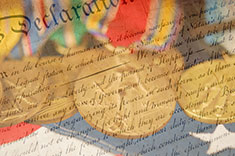Northeastern South Carolina History Subjects and Interests
Slave Life and Culture
South Carolina's African-American community, which has made a significant contribution to the history and culture of the Palmetto State, has its roots in South Carolina's slave culture. Today, a variety of historic sites preserve the issues, lifestyle and legacy of South Carolina's slave culture, which began in the 18th Century Colonial Era and continued until ratification of the 13th Amendment in 1865.

Several notable South Carolinians were delegtes to Continental Congress and among the signers of the Declaration of Independence.

Revolutionary War artillery battery at Fort Moultrie defended the harbor against the British attack.
Your Search For: Subject- Slave Life and Culture
Returned 25 records |
|
Downtown, Bennettsville, SC [View Map]
Overview
Encompassing much of downtown Bennettsville, the Bennettsville Historic District includes historic homes, churches and public buildings. Among them is the Marlboro County Historic Museum and a historic home that was commandeered by Northern troops during the Civil War.
|
|
1931 Brookgreen Drive, Murrells Inlet, SC 29576, 800-849-1931 or 843-235-6000 [View Map]
Overview
Established on the site of four 18th century rice plantations, Brookgreen Gardens is renowned for its Old South charm and natural beauty - and as the largest outdoor sculpture garden in North American.
|
|
360 Meeting Street, Charleston, SC 29403, Phone 843-722-2996 [View Map]
Overview
The oldest museum in the United States, the Charleston Museum was established in 1773. Its numerous exhibits, displays and artifacts survey South Carolina's rich history and culture.
|
|
22 Hobcaw Road, Georgetown, SC 29440 [View Map]
Overview
Located on the southern tip of Waccamaw Neck, north of Georgetown, Clifton Plantation was one of the most spectacular plantations of South Carolina's coastal rice empire. It was the home of William Alston.
|
|
229 Main Street, Conway, SC 29526, 843-248-1760 [View Map]
Overview
Designed by the architect of the Washington Monument, the historic Conway City Hall building was built in 1825 as the Horry County Courthouse. Today, it is the central landmark for the historic river town of Conway which is one of the oldest towns in South Carolina. The picturesque Conway Riverwalk enables visitors to stroll alongside one of South Carolina's most scenic black-water rivers.
|
|
Highway 38, Latta, SC
Overview
Located adjacent to S.C. Highway 38, near Interstate 95 Exit 181A, near the town of Latta, the Early Cotton Press may be the oldest, original cotton press in the United States. While on private property, it may be viewed from a highway pullout.
|
|
9515 Freewoods Road, Myrtle Beach, SC 29588, 843-650-9139 [View Map]
Overview
A 40-acre living history center, Freewoods Farms is a restoration of the typical small farm operated by African-American families in South Carolina in the late 19th and early 20th centuries.
|
|
610 Ports Creek Drive, Georgetown, SC 29440, 843-546-6608 [View Map]
Overview
One of a handful of surviving rice plantations, Friendfield Plantation was established in 1735. Located on its handsome, landscaped 3,000 acres is an original slave street with six existing slave cabins.
|
|
Front Street, Georgetown, SC 29440 [View Map]
Overview
The third-oldest city in South Carolina, Georgetown is rich in history and culture, and offers visitors a wide variety of historic attractions from the Colonial Era to the present.
|
|
637 Front Street, Georgetown, SC 29442, 843-546-7423 [View Map]
Overview
Located on historic Front Street in Georgetown, the Georgetown Rice Museum and the adjacent historic Kaminski Hardware Building present the history of the Georgetown-region rice empire.
|
|
Gullah Geechee Trail
Click title above to visit the external web site at www.gullahgeecheecorridor.org in a new window for more information about this entry. |
|
1950 Rutledge Rd., McClellanville, SC 29458, 843-5469361 [View Map]
Overview
Maintained by the S.C. Department of Parks, Recreation and Tourism, Hampton Plantation State Historic Site preserves a Colonial-era rice and indigo plantation on the Santee River delta, approximately 16 miles south of Georgetown.
|
|
U.S. 301/76 at Wallace Woods Road, Florence, SC [View Map]
Overview
Located at U.S. 301/76 at Wallace Woods Road on the campus of Francis Marion University, the Hewn-Timber Cabins consist of two slave cabins from a 19th century cotton plantation located on the site of Francis Marion University. The cabins were constructed by slave craftsmen about 1836, feature displays and artifacts, and are open to the public.
|
|
22 Hobcaw Road, Georgetown, SC 29440, 843-546-4623 [View Map]
Overview
The 20th-century hunting preserve of Wall Street financier Bernard Baruch, Hobcaw Barony is now a nature preserve and a center for marine science research.
|
|
494 Hopsewee Road, Georgetown, SC 29440, 843-546-7891 [View Map]
Overview
Built more than 30 years before the American Revolution, Hopsewee Plantation was home to Thomas Lynch Senior and his son Thomas Lynch Junior, both of whom were delegates to the Continental Congress. Thomas Lynch Junior was the 52nd signer of the Declaration of Independence.
|
|
805 Main Street, Conway, SC 29526, 843-915-5320 [View Map]
Overview
The Horry County Museum is located on Main Street, in downtown Conway, and features a variety of well-designed exhibits that chronicle the colorful history of Horry County. Permanent exhibits focus on local Native American culture, the timber industry and naval stores operations.
|
|
909 Prince Street, Georgetown, SC [View Map]
Overview
Located at 909 Prince Street in Georgetown, the Joseph H. Rainey House was the home of the first African American to serve in the U.S. House of Representatives. This house is listed on the National Register of Historic Places.
|
|
147 West Main Street, Kingstree, SC 29556, 843-355-9321 [View Map]
Overview
Encompassing much of the historic riverside city, the Kingstree Historic District includes numerous historic homes, commercial structures and public buildings. The most familiar landmark is the Williamsburg County Courthouse, built in 1823, and designed by South Carolina architect Robert Mills who also designed the Washington Monument in Washington, D.C.
|
Page 1 of 2